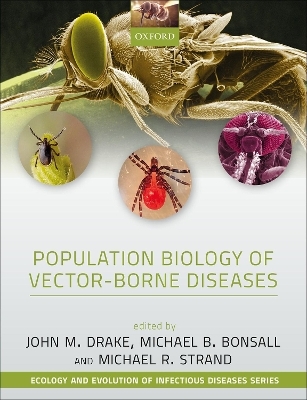
Population Biology of Vector-Borne Diseases
Oxford University Press (Verlag)
978-0-19-885325-1 (ISBN)
Population Biology of Vector-Borne Diseases is an advanced textbook suitable for graduate level students taking courses in vector biology, population ecology, evolutionary ecology, disease ecology, medical entomology, viral ecology/evolution, and parasitology, as well as providing a key reference for researchers across these fields.
John M. Drake is Associate Dean of Academic Affairs, Distinguished Research Professor of Ecology, and founding Director of the Center for the Ecology of Infectious Diseases at the University of Georgia, USA. Michael Bonsall is Professor of Mathematical Biology at the Department of Zoology, University of Oxford, UK. He heads the Mathematical Ecology Research Group at the department, which undertakes cross-disciplinary research using mathematical approaches to explore novel and rewarding problems in ecology, evolution, health and economics. Michael Strand is Professor at the Department of Entomology, University of Georgia USA. His research laboratory in the department investigates many areas under the broad umbrella of Insect Physiology.
1: John M. Drake, Michael Bonsall and Michael Strand: Introduction: current topics in the population biology of infectious diseases
Section I: Theory of Population Biology
2: Robert C. Reiner Jr. and David L Smith: Heterogeneity, stochasticity and complexity in the dynamics and control of mosquito-borne pathogens
3: T. Alex Perkins, Guido España, Sean M. Moore, Rachel J. Oidtman, Swarnali Sharma, Brajendra Singh, Amir S. Siraj, K. James Soda, Morgan Smith, Magdalene K. Walters and Edwin Michael: Seven challenges for spatial analyses of vector-borne diseases
4: Stephen A Lauer, Alexandria C Brown and Nicholas G Reich: Infectious disease forecasting for public health
5: John M. Drake, Krisztian Magori, Kevin Knoblich, Sarah E. Bowden and Waheed I. Bajwa: Force of infection and variation in outbreak size in a multi-species host-pathogen system: West Nile Virus in New York City
Section II: Empirical Ecology
6: Marta S. Shocket, Christopher B. Anderson, Jamie M. Caldwell, Marissa L. Childs, Lisa I. Couper, Songhee Han, Mallory J. Harris, Meghan E. Howard, Morgan P. Kain, Andrew J. MacDonald, Nicole Nova, and Erin A. Mordecai: Environmental drivers of vector-borne diseases
7: Simon Gubbins: Population biology of Culicoides-borne viruses of livestock in Europe
8: Maria A. Diuk-Wasser, Maria Pilar Fernandez and Stephen Davis: Ecological interactions influencing the emergence, abundance and human exposure to tick-borne pathogens
9: Michelle V. Evans, Philip M. Newberry and Courtney C Murdock: Carry-over effects of the larval environment in mosquito-borne disease systems
10: Sinead English, Antoine M. G. Barreaux, Michael B. Bonsall, John W. Hargrove, Matt J. Keeling, Kat S. Rock and Glyn A. Vale: Incorporating vector ecology and life history into disease transmission models: insights from tsetse (Glossina spp.)
Section III: Ecological Interactions
11: Christine M Reitmayer, Michelle V. Evans, Kerri L. Miazgowicz, Philip M. Newberry, Nicole Solano, Blanka Tesla and Courtney C. Murdock: Mosquito- virus interactions
12: Michael Z. Levy: Kindling, logs and coals: the dynamics of Trypanosoma cruzi, the etiological agent of Chagas Disease, in Arequipa, Peru
13: Kerri L. Coon and Michael R. Strand: Gut microbiome assembly and function in mosquitoes
Section IV: Applications
14: Sadie J. Ryan, Catherine A. Lippi, Kevin L. Bardosh, Erika F. Frydenlund, Holly D. Gaff, Naveed Heydari, Anthony J. Wilson and Anna M. Stewart-Ibarra: Direct and indirect social drivers and impacts of vector borne diseases
15: Michael Bonsall: Vector control, optimal control and vector-borne disease dynamics
| Erscheinungsdatum | 09.03.2021 |
|---|---|
| Verlagsort | Oxford |
| Sprache | englisch |
| Maße | 189 x 246 mm |
| Gewicht | 650 g |
| Themenwelt | Studium ► Querschnittsbereiche ► Epidemiologie / Med. Biometrie |
| Studium ► Querschnittsbereiche ► Prävention / Gesundheitsförderung | |
| Naturwissenschaften ► Biologie ► Zoologie | |
| ISBN-10 | 0-19-885325-4 / 0198853254 |
| ISBN-13 | 978-0-19-885325-1 / 9780198853251 |
| Zustand | Neuware |
| Haben Sie eine Frage zum Produkt? |
aus dem Bereich


